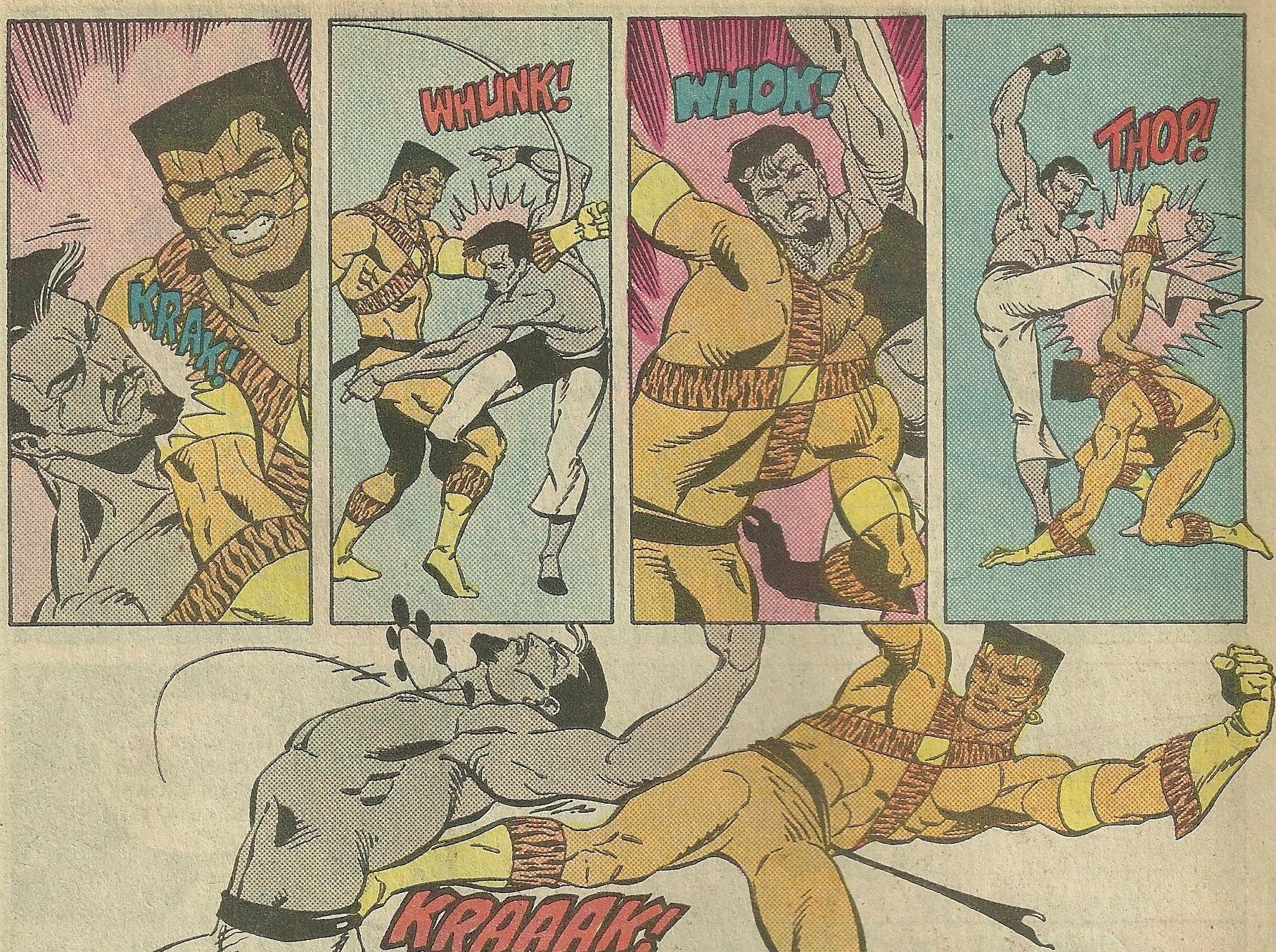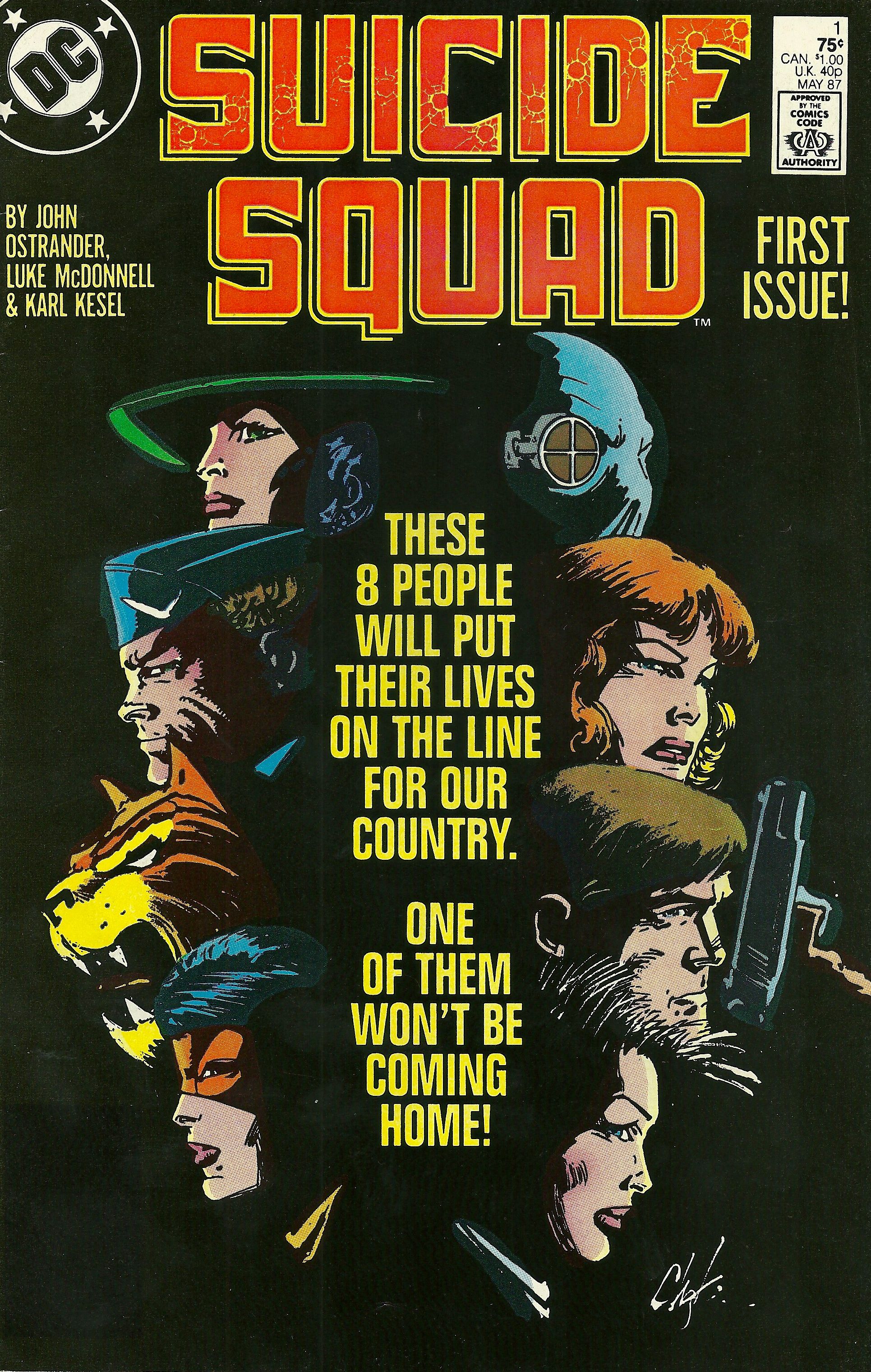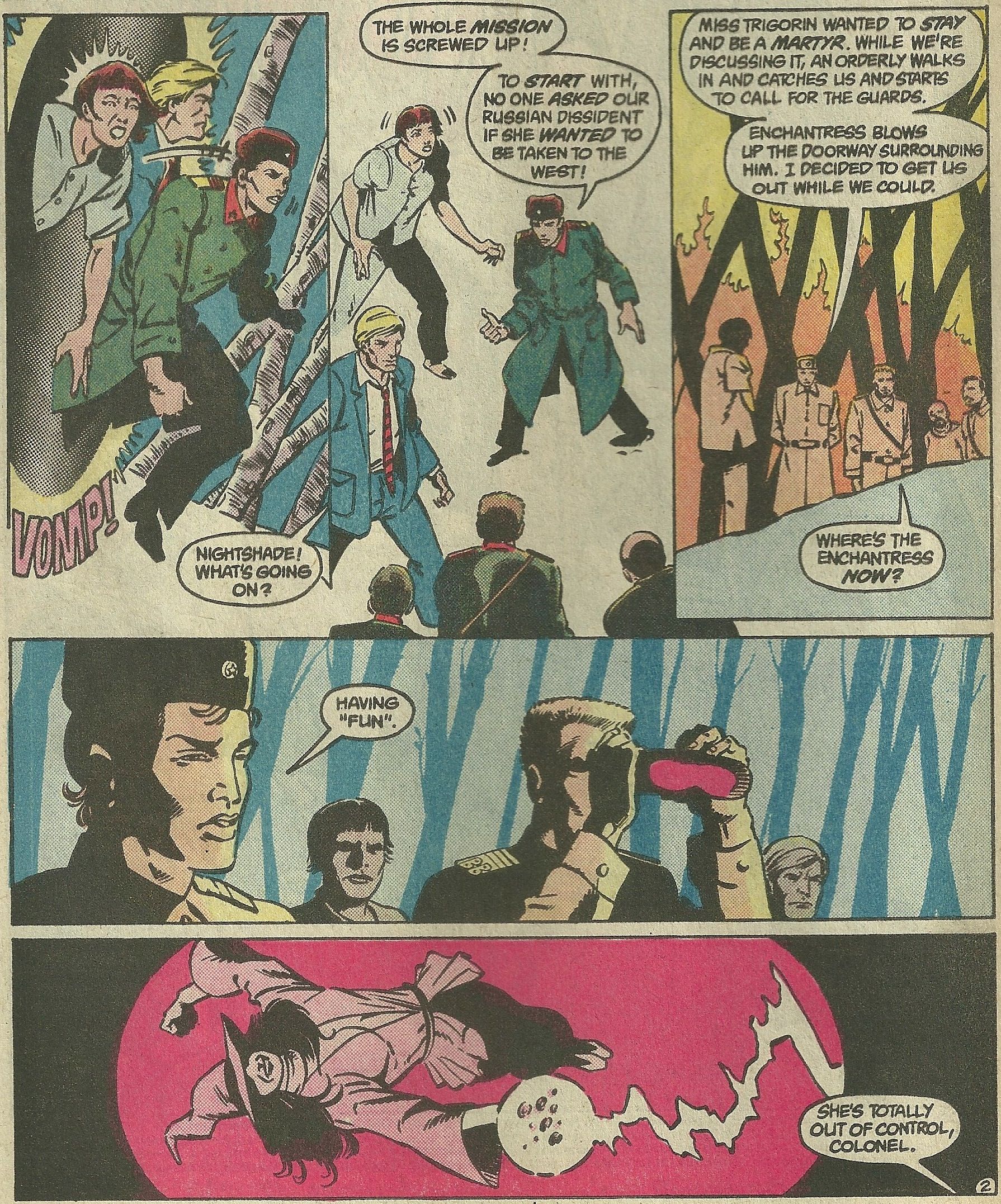A column in which Matt Derman (Comics Matter) reads & reviews comics from 1987, because that’s the year he was born.
Suicide Squad #1-8 (DC) by John Ostrander, Luke McDonnell, Karl Kesel (#1-3), Bob Lewis (#4-8), Carl Gafford, Todd Klein, and Robert Greenberger
The concept of Suicide Squad is elegantly simple, and maybe inevitable in the world of superheroes and villains. The difficulty of effectively imprisoning superpowered baddies has been explored in many ways in all kinds of comicbooks, and this series offers one more approach: a work release program for supervillains. And why not? There are all different levels of supervillainy, and as many different motivations for it as people participating in it, so anyone who wants to prove themselves less insane or untrustworthy than their peers might as well get a chance. Besides, giving them another venue/outlet for their abilities could potentially place them on a better path, even make them better people. Right?
Wrong, says Suicide Squad, which seems to believe that people, good or bad, pretty much are who they are no matter what. The book hinges on this philosophy, its drama fueled by the clashing and immovable personalities of its cast. In the world of Suicide Squad, the whole Suicide Squad project is a futile endeavor, an attempt to convince villains to act against their natures through an odd combination of bargains, threats, and field assignments. Trouble is, nobody can ever act against their nature in this book, so the Squad fails or at least half-fails on every outing, refusing to gel as a group and generally causing more harm than good to its members and the rest of the world.
Not everyone in the Suicide Squad is even a villain; they're led by good guys, though in this case that's only a relative term. The head of the program, the person handing out missions and calling all the shots, is Amanda Waller, though like all good heads of government agencies, she stays out of the actual field. The commander on the ground is Col. Rick Flag, a somewhat reluctant leader who stays in the position out of a sense of obligation rather than actually believing in what he's doing or having any desire to keep it up. His second-in-command is the Bronze Tiger, an amnesic former member of the League of Assassins, looking for help in retrieving his memories. He is probably the most stable and self-possessed member of the cast, and easily the best and most reliable in a fight. These three people rarely if ever see eye-to-eye, particularly Waller and Flag, but the attribute they share (and that the rest of the team lacks) is loyalty. They obey orders even when they disagree with them, dutifully trying to turn the Squad into a functional unit despite the impossibility of the task.
There are other heroes in the mix as well, namely Nemesis and Nightshade. Their reasons for being on the team are a bit less clear, and it seems like they're mainly there because their abilities are especially useful for the kind of work the Squad tends to
do. Though superpowers are almost always involved on both sides of the conflict, Suicide Squad stories tend to have more of a spy thriller feeling than that of straight superhero action-adventure melodrama. So Nightshade's teleportation and Nemesis' disguise skills are extremely useful tools to have on hand for all the espionage. Unfortunately, both characters struggle with the messed up morality and unavoidable corruption that comes with working alongside villains, Nemesis most of all. He eventually gets so fed up with it that he quits in the middle of a mission, then later surrenders himself to the Russians (in the 80's!) and is arrested for crimes mostly committed by the rest of the team.
The only full-time cast members who are also a full-time villains are Captain Boomerang and Deadshot, with other baddies joining and leaving the series from one arc to the next. Though in theory these men both represent the evil side of the equation, their respective attitudes about being part of this team are quite different. Deadshot seems almost into it, happy to be have government-sanctioned targets, eager to take up any cause so long as he gets to shoot somebody. Boomerang, on the other hand, whines out loud as often as possible, and works tirelessly to gain ever more freedom for himself. He wears Waller down little by little, and is ultimately granted permission to live outside of Belle Reve, the prison which the Suicide Squad calls home, on the condition he behave himself while off-site. Of course, he quickly finds a way around that condition by dressing up as Mirror Master whenever he has the urge to do something criminal.
Finally, there's June Moone/Enchantress, who are either two distinct beings sharing a body or one woman with a split personality, depending on who you ask. June is fragile and good, wanting only to rid herself of the selfish, violent, maniacal Enchantress who lives inside her and constantly tries to break free. The Enchantress feels pretty much the same way, her greatest desire being to take control forever and eliminate June entirely. As the series progresses, Enchantress' power grows, and she gets harder for June or anyone else on the Squad to control, becoming more liability than asset in short order.
On top of all the regulars with their warring personalities and motivations, other imprisoned villains join up for just a mission or two in order to get their own sentences commuted, so Suicide Squad's line-up is always changing. The steady coming and going of fresh blood means that nothing ever settles or stabilizes, and there are no good opportunities for solid trust to develop. Indeed, the idea of everyone on the Squad trusting one another is never even approached, because everybody understands that the only reason most of them are there is to be let out of prison in exchange for doing the work. There's no pretense of any nobler goals or team unity. It's just criminals and their handlers hoping to keep it together long enough to make it back alive.
What I'm trying to highlight with all of this cast analysis is how internally conflicted the Suicide Squad is. Their inability to coalesce is a big part of what drives this comic, the source of much of its narrative momentum. What could be straightforward operations for a more well-oiled team become disastrous, fatal failures in the hands of this motley crew. Various members of the Squad work against its success, intentionally or not, at almost every turn. In the opening arc alone, first-timer Plastique turns traitor as soon as she can, while another newcomer, Mindboggler, is shot in the back and killed because Captain Boomerang overtly decides not to save her. It's a pretty clear opening statement about Suicide Squad's general dearth of hope for its titular team, and their group dynamics don't improve any over the course of these eight issues. They return from not succeeding, Waller reacts inappropriately to whatever went wrong this time, and then she sends them right back out on another assignment. It's an insane, reckless cycle, and it costs several lives—Squad members, their enemies, and one person they're supposed to be rescuing. This ceaseless stream of losing fights and personnel understandably wears on Flag, making him a worse leader, thus making the team even worse, and so on. Everybody's trapped in these patterns, collectively and individually, because they can't and won't find any common ground upon which to build a congruous identity or strategy.
This depressing, self-defeating set-up works in large part because of the consistent creative team. With the exception of inking duties, which switch from Karl Kesel to Bob Lewis starting with Suicide Squad #4, all eight issues are by the same group of creators, giving the series consistency and cohesion its star team can never have. Penciler Luke McDonnell handles the dreariest, most brooding scenes just as well as the action, and that covers pretty much everything. There's not a lot of room in between the dark emotional moments and the fights, but McDonnell's art makes all of that compelling and varied so that it never feels repetitive. As does colorist Carl Gafford, whose palette is bright and clear enough to make the fight scenes pop yet toned down enough to add heavy atmosphere to the moodier beats. The whole art team walks that line so the drama doesn't suffocate and the action stays fresh. And when needed, they combine those two elements for great effect, crafting devastating scenes of unexpected violent death and/or widespread combat.
John Ostrander's scripts have several things in common beyond the inflexibility of the cast (and the catastrophes which result) to make Suicide Squad smart, weird, good reading. The motives of the Squad's opponents or targets are always an important part of each story. We don't necessarily side or even empathize with them, but Ostrander makes sure we understand the perspectives of all the players, even when they can't understand each other. He also writes short stories, with the longest arc here taking up only three issues, and another three of the issues being one-shots. Though their endings are a tad abrupt sometimes, the brevity does not, in general, detract from the density of the narratives. Ostrander has some fun, bizarre ideas, and explores them efficiently while always keeping the Squad's dysfunction in the foreground. The ethical questions of freeing someone who wants to remain a prisoner, a rich racist using public vigilantism to secretly recruit for hate groups...even the half-page or so devoted to explaining how Belle Reve keeps Parasite alive but vegetative was interesting, lasting stuff. These are ideas that stick, and Ostrander explores and expands them while still making the most of every page.
Neither the art nor the writing do anything particularly daring, mind-warping, or outlandish. Instead, they show the power of more straightforward storytelling, focused less on spectacle than the emotional, psychological, and moral complexities of the protagonists and their work. Ostrander sets as a rule for this series that people cannot change, and then assembles a bunch of characters who are fundamentally at odds with one another and puts them in life-or-death scenarios and unfamiliar locations with little to no support. That's a hell of a hook, and the continued existence of the Suicide Squad after each screw-up only heightens the intensity and reinforces the reader's investment; if things are already this crazy, splintered, and awesome, it's easy to imagine how great it'll be down the line when the Squad has really fallen to pieces.



